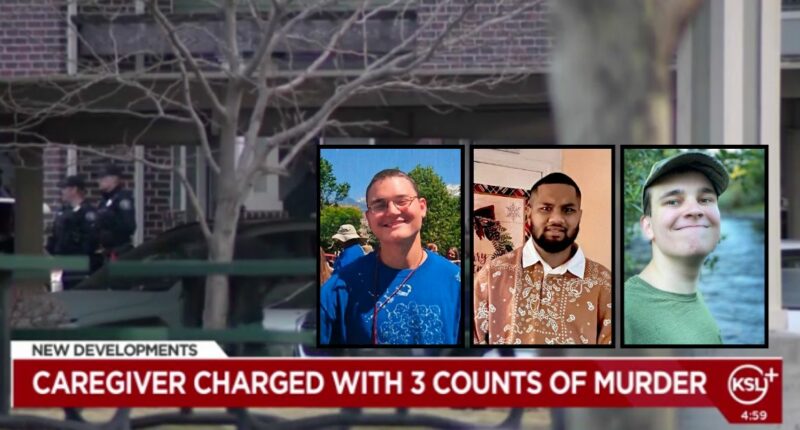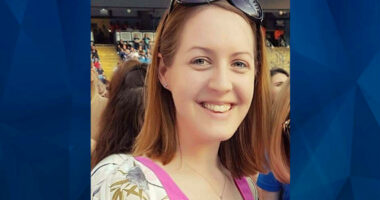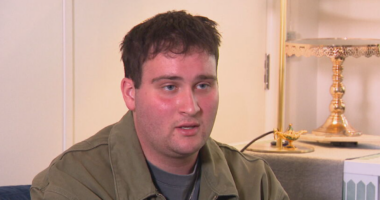Share this @internewscast.com
Insets, from left: Timothy Jones, Mosa’ati Moa, and Colton Moser (GoFundMe). Background: Cops in West Valley, Utah, investigate after Jones, Moa and Moser were found dead in a van (KSL).
In a tragic incident in Utah, a caregiver tasked with providing a day of entertainment for three special needs men instead left them in a running van inside his “very small” garage. This decision resulted in their deaths, while the caregiver, Isaiah Vaughn Pulu, indulged in a meal and anime for over four hours, according to police reports.
Isaiah Vaughn Pulu now faces three murder charges following the deaths of Colton Moser, 25, Mosa’ati Moa, 22, and Timothy Jones, 39. Authorities were called to an apartment complex on South High Parkway in West Valley, near Salt Lake City, on February 6. Upon arrival, they discovered the three men unconscious within a van parked in a garage.
The autopsy revealed no physical trauma, suggesting the men succumbed to carbon monoxide poisoning. Notably, the carbon monoxide alarm in the apartment above the garage was triggered, registering levels as high as 600 parts per million, though the concentration in the garage remains unspecified.
Employed by Safe & Sound Services LLC, Pulu’s role involved collecting clients from group homes and providing them with daily outings to locations like parks or malls. Contrary to his responsibilities, Pulu drove the men to his residence, abandoning them in the vehicle while he retreated to his apartment, as outlined in the affidavit.
When questioned by police, Pulu reportedly explained, “I just wanted to get some food and watch my show.” He further recounted that one of the men had been combative earlier, prompting him to take a drive that ended at his home. Pulu admitted to arriving at his apartment around 10:30 a.m., leaving the vehicle’s engine running with the heat on and windows down.
The defendant said one of the men was being combative when he picked him up, so he took them for a drive and ended up at his home. He claimed he arrived at his apartment around 10:30 a.m. and went inside, leaving the men in the van. He said he kept the car on with the heat turned up and the windows down.
He said he had been trying to gain weight, so he wanted to eat. He also watched anime on TV. He said he came back outside around 1:30 p.m. to find the men unconscious. He called his mother in a panic and then called 911.
But Ring camera footage told a much different story. It showed he actually arrived at his apartment around 9 a.m., cops wrote. Around 1:30 p.m. — some 4 1/2 hours later — he came out to check on the men. He went in and out of the apartment several times and allegedly waited about 20 minutes to call 911.
In the 911 call, Pulu claimed the garage had been open the whole time the men were in the van, which it was not, cops wrote.
Detectives also spoke with Pulu’s boss who said the defendant initially lied to him, saying that only two of the men were in the van while the third was in the apartment, cops wrote. The boss knew Pulu was being untruthful because he already knew all three of them were dead, the complaint said.
According to the CEO of the company, employees are not allowed to take clients home. Pulu had also been disciplined in January for abandoning clients for about a half hour, per the complaint.
A GoFundMe account description for Moser called his death a “shocking and deeply senseless act of negligence.”
“Our world stopped in an instant, and nothing will ever feel the same again. The pain of losing him this way is something no family should ever have to endure,” his family wrote. “Colton had a big bright smile and a very special spirit that impacted everyone around him. He taught us all so much about how beautiful being different truly was and to not judge others. We are so grateful for the 25 years we were honored to be his family and will miss him every day.”
The families of Moa and Jones also started GoFundMe accounts.
Moa had “a unique personality, a gentle spirit, and a way of touching lives simply by being himself. His loss has left an immeasurable void in our hearts,” his family wrote.
Jones’ family said he “was deeply loved, and his passing has left a profound void in the lives of many.”
Salt Lake County District Attorney Sim Gill announced the charges at a press conference on Friday, saying Pulu’s actions showed a “depraved indifference to human life.”
“There are three individuals, who are disabled individuals, who need oversight who need care from folks, (and) they are left unattended with the vehicle running and extended period of time. There’s also been a warning that he had earlier that said that he cannot leave people unattended, which he was aware of,” Gill told reporters, per local NBC affiliate KSL.
Pulu is at the Salt Lake County Jail without bond.














